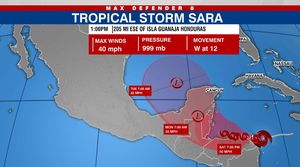The Supreme Court made headlines on November 14, 2024, with its recent decision to reject former White House Chief of Staff Mark Meadows' appeal. Meadows sought to move his election interference case from Georgia state court to federal court, arguing for immunity due to his status as a former federal officer. This ruling marks yet another chapter in one of the most contentious legal battles stemming from efforts to overturn the results of the 2020 presidential election.
Meadows, along with 18 others, has been indicted by Fulton County District Attorney Fani Willis for allegedly conspiring to keep Donald Trump in power after he lost to Joe Biden. The case revolves around accusations of engaging in illegal activities, including pressuring Georgia officials to falsify election results. At the heart of this legal drama is Meadows' participation in a phone call where Trump urged the Secretary of State, Brad Raffensperger, to “find” the votes necessary to sway the election outcome.
Meadows contended his actions were within the scope of his duties as Chief of Staff, asserting this justified his case being handled at the federal level. The case’s transfer to federal court could have provided him with strategic advantages, such as jury selection more favorable to his interests and potential presidential pardons if Trump were to regain office.
But the Supreme Court's ruling came after the 11th Circuit Court of Appeals had already determined Meadows was no longer acting as a federal official during the alleged misconduct. This decision emphasized the state court's jurisdiction over the matter, as Meadows' actions, according to the appellate court, fell outside the purview of his official duties.
During the tumultuous period leading up to the Supreme Court's decision, Meadows had become more embattled. His initial attempts to move the case to federal court were met with sharp objections from prosecutors, who argued he could not demonstrate he acted officially during the attempts to overturn the election results. They pointed out Meadows' involvement directly contravened his federal duties, invaliding his claims for swap out.
Dr. Fani Willis has remained steadfast as she leads the charge against Meadows and his co-defendants. The District Attorney blanketed the case with serious allegations under Georgia's RICO (Racketeer Influenced and Corrupt Organizations) law, which is often used against organized crime. The stakes for Meadows and the others are high, as their actions have sparked significant political fallout and public scrutiny.
After the Supreme Court's decision, Meadows expressed disappointment but remained resolute. His attorney, George Terwilliger, affirmed Meadows' commitment to claiming his innocence, stating they expect to achieve exoneration as the case proceeds through the state court system. Terwilliger argued Meadows' case should have been granted federal review, citing precedents related to immunity for government officials carrying out their duties.
While four co-defendants have pleaded guilty and are cooperating with the prosecution, Meadows and another 15, including Trump, maintain their innocence. This decision largely puts the brakes on advancing legal proceedings against Trump, who recently won reelection, leaving many questions about the broader impact of the legal challenges facing him and his associates.
Currently, with the case remaining intact within the Fulton County framework, the Georgia election interference saga presses on. Willis has supported reinstatement of six criminal charges against Trump, asserting they were dismissed prematurely and warrant renewed examination. The continuing developments could shape the political and legal landscapes leading up to what promises to be another electrifying presidential election.
The avenues available to Meadows and the other defendants remain to be seen as court dates are scheduled for 2025, which keeps the focus on the upcoming trial and potential strategies alike. Legal analysts are closely monitoring the challenges faced by the defendants as the groundwork is laid for what could be historic proceedings.



